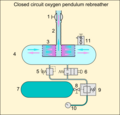Rebreather: Difference between revisions
CSV import |
CSV import |
||
| Line 38: | Line 38: | ||
{{stub}} | {{stub}} | ||
<gallery> | |||
File:Plongee-RecycleurInspiration 20040221-153656.jpg|Plongee Recycleur Inspiration | |||
File:Physiological effects of carbon dioxide concentration and exposure period.png|Physiological effects of carbon dioxide concentration and exposure period | |||
File:Rebreather architecture.png|Rebreather architecture | |||
File:Self-contained gas mask 8.jpg|Self-contained gas mask | |||
File:2009. Донецк 012.jpg|2009 Donetsk | |||
File:Draeger Ray DSV and breathing hoses P5167633.JPG|Draeger Ray DSV and breathing hoses | |||
File:Aa proto1.jpg|Aa proto1 | |||
File:Oxygen CCR pendulum schematic.png|Oxygen CCR pendulum schematic | |||
File:Oxygen CCR loop schematic.png|Oxygen CCR loop schematic | |||
File:Agnes Milowka by J Axford.jpg|Agnes Milowka by J Axford | |||
</gallery> | |||
Latest revision as of 05:25, 3 March 2025
Rebreather
A Rebreather is a type of breathing set that provides a breathing gas containing oxygen and recycled exhaled gas. This recycling reduces the volume of breathing gas used, making a rebreather a good tool for underwater diving and space travel.
History[edit]
The concept of re-breathing has been around for several centuries. The first rebreather, designed by Henry Fleuss in 1878, was used to help divers stay underwater for longer periods of time.
Types of Rebreathers[edit]
There are three main types of rebreathers: oxygen rebreather, semi-closed circuit rebreather, and closed circuit rebreather.
Oxygen Rebreather[edit]
An oxygen rebreather is a rebreather that uses pure oxygen as the only source of oxygen.
Semi-Closed Circuit Rebreather[edit]
A semi-closed circuit rebreather uses a gas mix of oxygen and an inert gas, such as nitrogen or helium.
Closed Circuit Rebreather[edit]
A closed circuit rebreather uses a gas mix that is typically one third oxygen and two thirds inert gas.
Advantages and Disadvantages[edit]
Rebreathers have several advantages over other breathing sets. They are more gas efficient, produce no bubbles, and allow for longer dive times. However, they are also more complex and expensive.
See Also[edit]
|
|
|
-
Plongee Recycleur Inspiration
-
Physiological effects of carbon dioxide concentration and exposure period
-
Rebreather architecture
-
Self-contained gas mask
-
2009 Donetsk
-
Draeger Ray DSV and breathing hoses
-
Aa proto1
-
Oxygen CCR pendulum schematic
-
Oxygen CCR loop schematic
-
Agnes Milowka by J Axford












